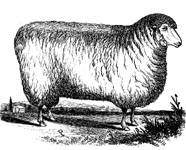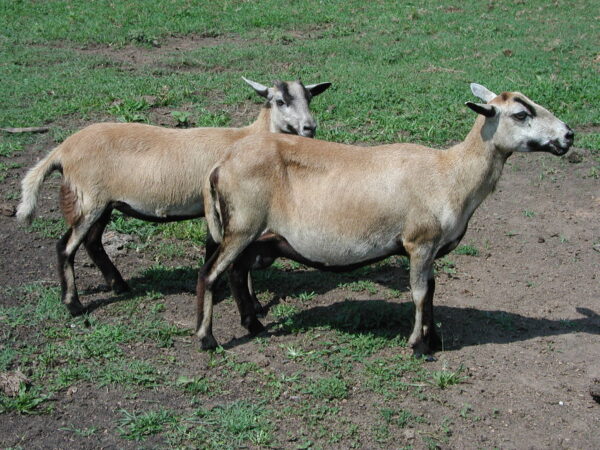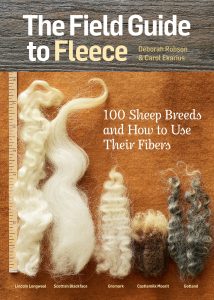
Breed Facts
Status:
Recovering
Use:
Meat
Adult Weight:
Rams: 100-130 lbs. Ewes: 85-100 lbs.
Temperament:
Alert, Docile
Experience Level:
Novice – Intermediate
Notes:
Prolific; polled hair sheep; can survive on poor pasture and in hot environments; sociable and like to be in groups
BARBADOS BLACKBELLY SHEEP
The Barbados Blackbelly is a hair sheep breed that evolved on the island of Barbados in the Caribbean. The breed descends from crosses of African hair sheep and European wooled breeds that were brought to the island beginning in the mid-1600s.
The first documented importation of Barbados sheep into the US occurred in 1904. The sheep attracted the most interest in Texas where they were loosely managed and often crossed with Mouflon (a feral horned sheep) and Rambouillet to create a game animal with a large set of horns. By carefully selecting for horn growth, shedding ability, and color characteristics, this crossbreed was developed into a separate breed of sheep called the American Blackbelly.
In the 1970s, Dr. Lemmuel Goode of North Carolina State University imported a small number of Barbados Blackbelly sheep directly from the island. Sheep from this importation have been the foundation for pure island-type Barbados Blackbelly sheep in the US. In 1996, this flock was sold to a private breeder.
A large research flock is owned by Virginia State University. In addition, recognizing the genetic crisis that was extinguishing the breed in the US, a handful of private breeders formed an informal cooperative to preserve the remaining genetics and reestablish the breed in the US.
Barbados Blackbelly sheep have a reddish-brown or tan body with black on the belly and legs and black facial bars. Rams have a mane of thick hair that extends down the neck and brisket and may cover the shoulder. Ears point forward from the side without drooping. Both sexes are polled. They are known for their unique red eyes. They are non-seasonal producers, meaning they breed and lamb year-round. The ewes can maintain pregnancies throughout the heat of the summer. The ewes are prolific, producing twins or triplets and can lamb twice a year under certain husbandry conditions.
The Barbados Blackbelly is a slow-maturing breed and does not reach ideal weight – ewes 85-100 lbs. and rams 100-130 lbs.- until they are about 2 years old. This relatively small body size has been favored by both natural and human selection in the Caribbean. Smaller sheep tolerate heat better, and farmers desire the smaller carcasses, especially when refrigeration is lacking.
Their meat is described as having an excellent, mild flavor, likely due to it having less fat than the meat of other breeds. (The distinctive flavor of lamb meat is due to this fat.)
Barbados Blackbelly sheep thrive in the hot, humid environments that are challenging for most sheep, but also do well in colder climates. Barbados Blackbellys are excellent foragers and can survive on poor-quality pasture. They are highly resistant to disease and can tolerate a higher worm load without requiring chemical intervention.
This alert breed is low-maintenance as it does not require shearing – they naturally shed their wool each year. They are sociable and like to be in groups. They can be a good option for farmers who do not have a lot of experience with sheep.
Prospects for the Barbados breed in the US are improving. The strong market for hair sheep, both here and in other countries, has encouraged those engaged in breed conservation. The Barbados Blackbelly Sheep Association International (BBSAI) reports that the number of annual Barbados Blackbelly registrations has risen. The Barbados Blackbelly clearly deserves such attention. Its African origin (unusual in the Americas) and adaptation to tropical climates (unusual for sheep) gives the breed significant genetic value and production importance.
Did you know:
Since we launched the Microgrants program in 2018, dollars have been awarded to help every one of the 11 species we serve. Almost one-third of the breeds on the CPL have received funding. Yet, only about 8% of microgrant projects can be funded each year. Click here to help us support more endangered breeds and hard-working farmers, ranchers, and shepherds with your gift today.
You may be interested in…

Breed Facts
Status:
Recovering
Use:
Meat
Adult Weight:
85 – 130 lbs
Temperament:
Alert, Docile
Experience Level:
Novice -Intermediate
Notes:
Prolific, polled hair sheep
You may be interested in…




